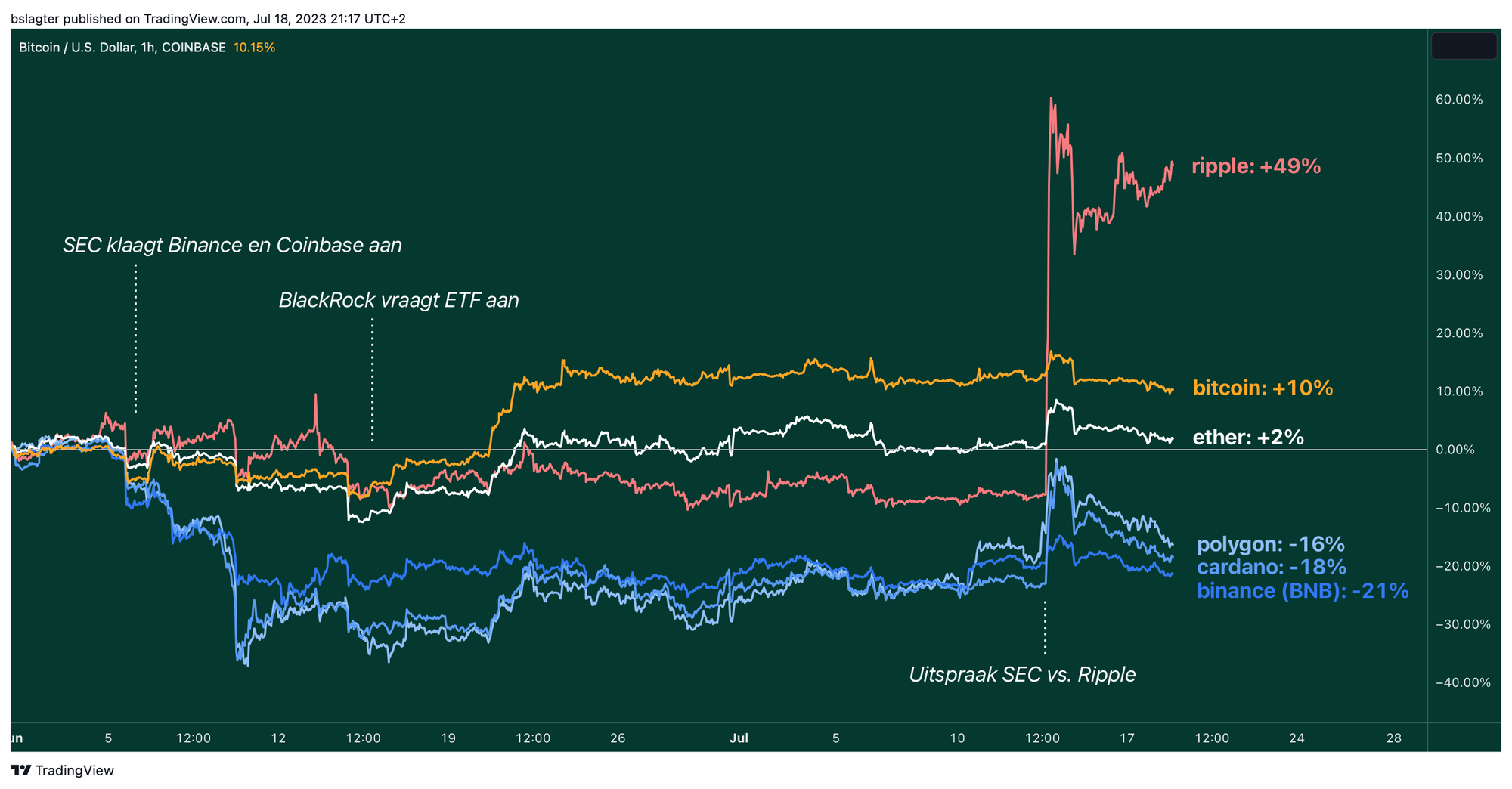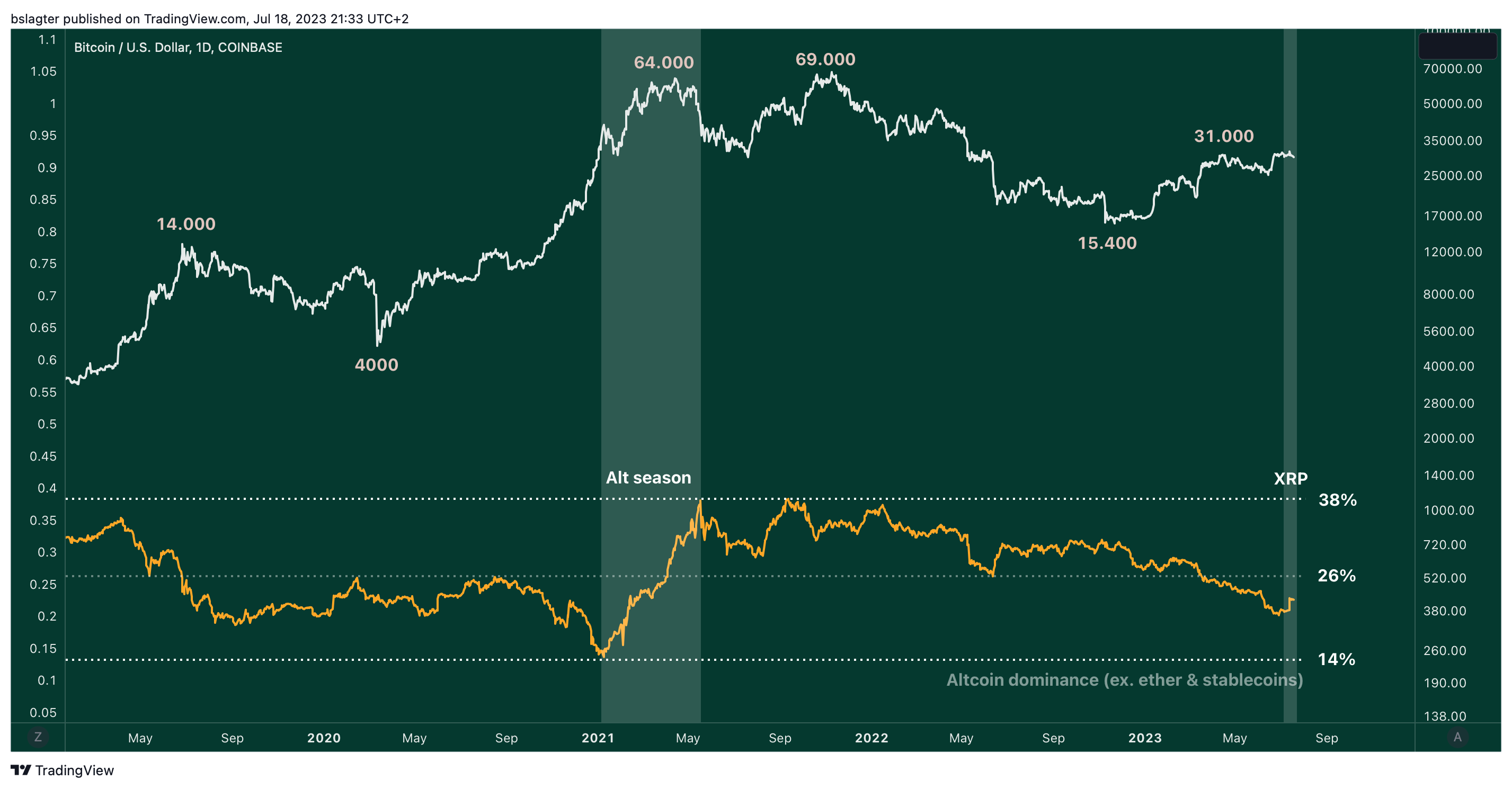Ripple makes significant win in lawsuit against SEC

6 September 2023
In late 2020, Ripple was taken to court by the SEC. Now, two and a half years later, the first verdict has been delivered. Who walked away with the win? That depends on who you ask. You can read about this, and more, in this Weekly!
Cryptomarket
Last week, the market was completely dominated by the case between Ripple and regulator SEC. We write more about its outcome in the news summary. That the market is interpreting it as favourable to Ripple for the time being can be seen in Ripple's share price.
To show that, we take out the chart we used earlier to show the differences between bitcoin, ether and the major altcoins mentioned in the lawsuits against Coinbase and Binance. To this selection, we have added ripple.

The chart nicely shows how the BlackRock ETF filing mainly gave bitcoin wind at its back, and how the ruling in the Ripple case mainly boosted altcoins. Ripple makes the biggest jump, polygon, and cardano are in between and Binance coin barely benefits.
The euphoria around Ripple raises the question of whether a new alt season has arrived. That is unlikely. At this stage of the market cycle, large, familiar technologies with their own network effect and a proven track record usually dominate. Most analysts place only bitcoin and ether in that category.
In the chart below, we have drawn the bitcoin price at the top, and the altcoin dominance at the bottom. That is the share that all altcoins together take of the total market value of all crypto assets put together. If it rises (quickly), altcoins are doing (much) better than bitcoin and ether: alt season!
On the right, we have marked the period when the Ripple statement became known with 'XRP', the symbol of the Ripple coin. You see, it's only a small uptrend.
Some altcoins are showing some strength relative to bitcoin, but we want to make two caveats to this.
First, it remains to be seen whether this rise will continue. At this stage in the market cycle, the weakness of altcoins against bitcoin belongs in principle. Individual assets may well outperform, but an alt season is unlikely.
Secondly, 'doing well relative to bitcoin' is more like 'making up something from big losses relative to bitcoin'. For instance, solana stands out with almost doubling in value against bitcoin in a month. But even after that doubling, the solana/bitcoin price is still 80% lower than in the bull market.
If this market cycle resembles the previous three, it will take at least another year before capital in the crypto market shifts to increasingly risky assets. That will happen only after bitcoin sets a new all-time high. In other words, new record prices in bitcoin are a signal that a new alt season may be imminent!

News summary
The lawsuit filed by the SEC against Ripple began on 22 December 2020. The accusation? The company allegedly raised over $1.3 billion through the illegal sale of securities.
The sale of XRP tokens went through several routes. Some were sold to institutional investors, some were offered through exchanges, and some were distributed to employees and project partners. It was up to the court to rule on these three distribution methods. Were they legal?
No, the judge said of the sales to institutional investors. In each case, it was clear that the buyer had a profit expectation and that Ripple was paid for it. Offerings of such investment contracts require a green light from the SEC and so were illegal unregistered securities offerings. Profit for the regulator.
“
XRP, as a digital token, is not in and of itself a "contract, transaction[.] or scheme" that embodies the Howey requirements of an investment contract.
In other words, the token is not necessarily a security. Its classification depends entirely on the circumstances, such as what the token represents and how the token is presented. In selling it to institutional investors, the problem was not the token, but the packaging in which it was presented.
This distinction was underlined when assessing the second and third distribution methods. These fell out in Ripple's favor.
For Ripple, this is a significant victory. The company now knows that the token XRP is not a security. So that is different from a share of Apple, which is in itself a security, regardless of how it is offered or traded. This gives exchanges confidence that they can offer XRP; five of the world's largest exchanges said Thursday and Friday they were going to do so (again).
Still, the ruling provides less clarity than was hoped. The fact that each situation and each token has to be assessed again separately continues to hang over the market. This versatility also ensures that everyone can explain this ruling as a victory; both Ripple and the SEC see themselves as champions. The risk for altcoin traders is that the joy of victory is premature and exaggerated.
If this case makes anything clear, it is that the ball is in the legislator's court. The latter should put on paper how 'the market' should handle the classification, issuance, and trading of crypto assets. That will save a lot of lawsuits!
Want to read more about the Ripple case and its implications for other projects and ongoing lawsuits? This edition of Bitcoin Alpha takes a closer look at it. A subscription to Bitcoin Alpha costs just 1 euro for the first month! Other news:
'Crypto bank' Celsius sued, ex-ceo Mashinsky arrested. The US market regulator FTC fined the 2022 bankrupt company on Thursday for an equivalent of €4.2 billion. It was fined for "defrauding consumers". Former top executive Alex Mashinsky has also been arrested and the US stock exchange authority SEC has filed a lawsuit against him. If convicted, Mashinsky could face years in prison.
Europe will soon get its first bitcoin ETF. Jacobi Asset Management originally announced that its bitcoin ETF would be listed on Euronext Amsterdam in July 2022. It now says the fund is "on track" to launch this month. Last year, it delayed the launch because "the time was not right" due to Terra's crash and FTX's fall. The product is similar in features to bitcoin ETNs already traded on European exchanges.
US presidential candidate wants to issue bitcoin-based government bonds Robert F. Kennedy Jr. wants the US to slowly but surely move back to a currency system based on value-based collateral, such as gold, silver, platinum and bitcoin. His plan is to start with an allocation of 1 per cent and build that slowly. Part of the plan is to remove the current wealth tax on bitcoin.
Deepen
Amdax is involved in the new season of Satoshi Radio as a sponsor. This Dutch-language podcast has been an important source of information for serious crypto investors for years. The latest episode focuses on bitcoin's market cycle. What it is, how to recognise it, where we are now, and what is the next phase? You can hear it on YouTube or in a podcast player of your choice!
Behind the scenes
Over the past few months, we have expanded our range of business services. Today, we would like to explain our NFT solution for businesses.
Non Fungible Tokens (NFTs) have become an important niche within the world of digital assets in recent years. Organisations, brands, artists and performers use NFTs as an innovative way to connect with customers and fans. Amdax facilitates the issuance, storage and compliance of issuing NFTs for organisations.


Our website uses cookies
We use cookies to personalize content and advertisements, to offer social media features and to analyze our website’s traffic. We’ll also share information about your usage with our partners for social media, advertising and analysis. These partners can combine this data with data you’ve already provided to them, or that they’ve collected based on your use of their services.